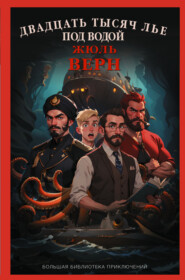По всем вопросам обращайтесь на: info@litportal.ru
(©) 2003-2024.
✖
Round the World in Eighty Days
Настройки чтения
Размер шрифта
Высота строк
Поля
"You!"
"Yes, it is I."
"Well then, under those circumstances you had better go on board the steamer."
So Mr. Fogg, Aouda, who accompanied him, and Passe-partout hastened out of the theatre. At the door they met the Honourable Mr. Batulcar, who was furious, and demanded damages for the breaking of the "Pyramid." Mr. Fogg quickly appeased him by handing him a roll of notes.
At half-past six, the appointed hour for the sailing of the vessel, Mr. Fogg, Mrs. Aouda, and Passe-partout, who still wore his wings and long nose, stepped upon the deck of the American mail-steamer.
CHAPTER XXIV
In which the Pacific Ocean is crossed.
The reader will easily guess what happened at Shanghai. The signals made by the Tankadere were perceived by the mail-steamer, and soon afterwards, Phileas Fogg having paid the price agreed upon, as well as a bonus of five hundred and fifty pounds, he and his party were soon on board the steamer.
They reached Yokohama on the 14th, and Phileas Fogg, leaving Fix to his own devices, went on board the Carnatic, where he heard, to Aouda's great delight, and probably to his own though he did not betray it, that a Frenchman named Passe-partout had arrived in her the day before.
Mr. Fogg, who was obliged to leave for San Francisco that very evening, immediately set about searching for his servant. To no purpose was it that he inquired at the Consulate or walked about the streets, and he gave up the search. Was it by chance or presentiment that he visited Mr. Batulcar's entertainment? He would not certainly have recognised his servant in his eccentric dress, but Passe-partout had spied his master out. He could not restrain a movement of the nose, and so the collapse had occurred.
All this Passe-partout learnt from Mrs. Aouda, who also told him how they had come from Hong Kong with a certain Mr. Fix.
Passe-partout did not even wink at the name of Fix, for he thought the moment had not yet come to tell his master what had passed; so in his recital of his own adventures, he merely said that he had been overtaken by opium.
Mr. Fogg listened coldly to his excuses, and then lent him money sufficient to obtain proper clothes. In about an hour he had got rid of his nose and wings, and was once more himself again.
The steamer in which they were crossing was called the General Grant, and belonged to the Pacific Mail Company. She was a paddle-steamer of two thousand five hundred tons, had three masts, and at twelve knots an hour would not take more than twenty-one days to cross the ocean; so Phileas Fogg was justified in thinking that he would reach San Francisco on the 2nd of December, New York on the 11th, and London on the 20th, so gaining several hours on the fatal 21st.
Nothing of any consequence occurred on the voyage. The Pacific fully bore out its name, and was as calm as Mr. Fogg himself. Mrs. Aouda felt more and more attached to this taciturn man by even stronger ties than gratitude. She was more deeply impressed than she was aware of, and almost unconsciously gave herself up to emotion, which, however, did not appear to have any effect upon Mr. Fogg. Besides, she took the greatest interest in his projects – anything that threatened to interfere with his plans disquieted her extremely. She frequently consulted with Passe-partout, and he, guessing how deeply she was interested, praised his master all day long. He calmed her apprehensions, insisted that the most difficult part of the journey had been accomplished, that they would be soon in civilised countries, and the railway to New York and the transatlantic steamer to Liverpool would bring them home within their time.
Nine days after leaving Yokohama, Mr. Fogg had traversed just exactly one half of the globe. On the 23rd of November this General Grant passed the 180th meridian, the antipodes of London. Of the eighty days he had had, he had, it is true, spent fifty-two, and only twenty-eight remained; but it must be remarked that if he had only gone halfway, according to the difference of meridians, he had really accomplished two-thirds of his journey. He had been obliged to make long detours; but had he followed the 50th parallel, which is that of London, the distance would only have been twelve thousand miles, whereas by the caprices of locomotion he had actually been obliged to travel twenty-six thousand miles, of which he had now finished seventeen thousand five hundred. But now it was all plain sailing, and Fix was not there to interfere with him.
It also happened on that day that Passe-partout made a great discovery. It may be remembered that he had insisted on keeping London time with his famous family watch, and despised all other timekeepers on the journey. Now on this day, although he had not touched it, his watch agreed exactly with the ship's chronometer. His triumph was complete, and he almost wished Fix had been there that he might crow over him.
"What a lot of falsehoods the fellow told me about the meridians, the sun, and the moon. Nice sort of time we should keep if we listened to such as he. I was quite sure that the sun would regulate itself by my watch one of these days."
Passe-partout did not know that if his watch had been divided into the twenty-four hours like Italian clocks, the hands would now show that it was nine o'clock in the evening instead of nine o'clock in the morning – that is to say, the one-and-twentieth hour after midnight, which is the difference between London time and that at the 180th meridian. But this Passe-partout would not have acknowledged even if he understood it, and, in any case, if the detective had been on board. Passe-partout would have argued with him on any subject.
Now, where was Fix at that moment?
Fix was actually on board the General Grant.
In fact, when he reached Yokohama, the detective immediately went to the English Consulate, where he found the warrant which had come by the Carnatic, on which steamer they thought he himself had arrived. His disappointment may be guessed, for the warrant was now useless, and an act of extradition would be difficult to cause Fogg to be arrested.
"Well," he thought, when his first anger had evaporated, "if the warrant is no use here it will be in England. The fellow is returning to his native land, thinking he has put the police off the scent. I will follow him; but I hope to goodness some of this money will be left. He must already have spent more than five thousand pounds; however, the bank can afford it."
So he made up his mind to proceed on the General Grant, and was actually on board when Mr. Fogg and Mrs. Aouda arrived. He was surprised to recognise Passe-partout in such a dress, but he quickly went down-stairs to avoid explanation, and hoped, thanks to the number of passengers, that he would remain unperceived by his enemy. But that very day he came face to face with Passe-partout.
Passe-partout, without a word, caught him by the throat, and greatly to the delight of the bystanders, who immediately made bets on the result, he proved the superiority of the French system of boxing over the English.
Passe-partout was much refreshed by this exercise. Fix rose in a very dishevelled condition, and asked his adversary "whether he had quite finished?"
"For the present, yes."
"Then let me speak to you."
"But – "
"It is all in your master's interest."
Passe-partout seemed conquered by the detective's coolness, and followed Fix to the fore part of the ship.
"You have given me a licking," said the detective. "So far, so good. I expected it; but just now you must listen to me. Hitherto I have been playing against Mr. Fogg. I am now in his favour."
"Oh, then you believe him honest at last?"
"By no means. I think he is a thief. Be quiet, hear me out. So long as Mr. Fogg was on British territory, I did all I could to detain him till the warrant for his arrest arrived. It was I who put the Bombay priests on your track. I hocussed you at Hong Kong. I separated you from your master, and caused him to lose the Yokohama steamer."
Passe-partout clenched his fists as he listened.
"But now," continued Fix, "Mr. Fogg appears likely to return to England. All right, I will follow him. But in future I will do as much to keep his way clear, as I have done to prevent his progress. I have changed my game, and have done so for my own interest; your interest is the same as mine, for it will be only in England that you will ever find out whether your master is honest or not."
Passe-partout listened attentively, and felt that Fix meant what he said.
"Are we friends?" asked Fix.
"Friends, no; allies, yes; but only to a certain point, for at the least sign of treason, I will twist your neck."
"That's a bargain," said the detective calmly.
Eleven days afterwards, viz. on the 3rd of December, the GeneralGrant entered the Golden Gate of San Francisco.
Mr. Fogg had neither gained nor lost a day.
CHAPTER XXV
A Glimpse of San Francisco. A Political Meeting.
At seven o'clock in the morning, Mr. Fogg and his companions landed in America, or rather upon the floating pier at which the steamers load and unload. There they mingled with ships and steamers of all nationalities, and steam ferry-boats with two or three decks which performed the service on the Sacramento and its affluents.
Passe-partout was so delighted to reach America, that he thought it necessary to execute one of his most active leaps. But when he landed upon the quay, he found the planks worm-eaten, and he went through them. His cry of alarm frightened all the birds which perched upon these floating quays.
Mr. Fogg's first care was to ascertain when the next train left for New York. It started at six o'clock, so they had a whole day before them. Then hiring a carriage, they drove to the International Hotel. From his position on the box of the vehicle, Passe-partout observed with great curiosity the wide streets, the rows of lofty houses, the churches and other places of worship built in the Anglo-Saxon gothic style, immense docks, palatial warehouses, innumerable cabs, omnibuses, and tramway-cars; while Americans, Europeans, Chinese, and Indians occupied the pathways. San Francisco surprised Passe-partout. It was no longer the habitation of bandits, incendiaries, and assassins, who gambled for gold-dust, a revolver in one hand and a knife in the other. This "good time" had passed. The city was now the hive of commerce. The tower of the city-hall overlooked the labyrinth of streets and avenues, which crossed each other at right angles, amongst which verdant squares extended; and the Chinese quarter looked like an importation from the Celestial Empire in a toy-puzzle. Sombreros, red shirts, and Indian head-dresses had given way to silk hats and black coats, and some of the principal streets were lined with splendid shops, offering the products of the whole world for sale.
When Passe-partout reached the International Hotel, he could scarcely recognise that he was not in England. The ground-floor of this immense building was occupied by a bar, at which free lunch of cold meat, oyster soup, biscuits and cheese, was always to be had; wine or beer had to be paid for. The restaurant was comfortable. Mr. Fogg and Mrs. Aouda sat down to a table, and were waited on by the blackest of negroes.
After breakfast, Phileas Fogg, accompanied by Mrs. Aouda, went to the English Consul to have his passport viséd. On the pavement he met his servant, who wanted to know whether he should not purchase some revolvers and rifles. Passe-partout had heard of Sioux and Pawnees, who are in the habit of stopping the trains. His master replied that the precaution was needless, but permitted him to do what he pleased in the matter, and pursued his way to the Consulate.
He had not gone very far when, of course by the merest chance, he met Fix. The detective appeared very much astonished. Was it possible that he and Mr. Fogg had crossed in the same steamer, and never met? Fix professed himself honoured at meeting the gentleman to whom he owed so much. Business called him to Europe, and he would be proud to travel in such agreeable company.

















